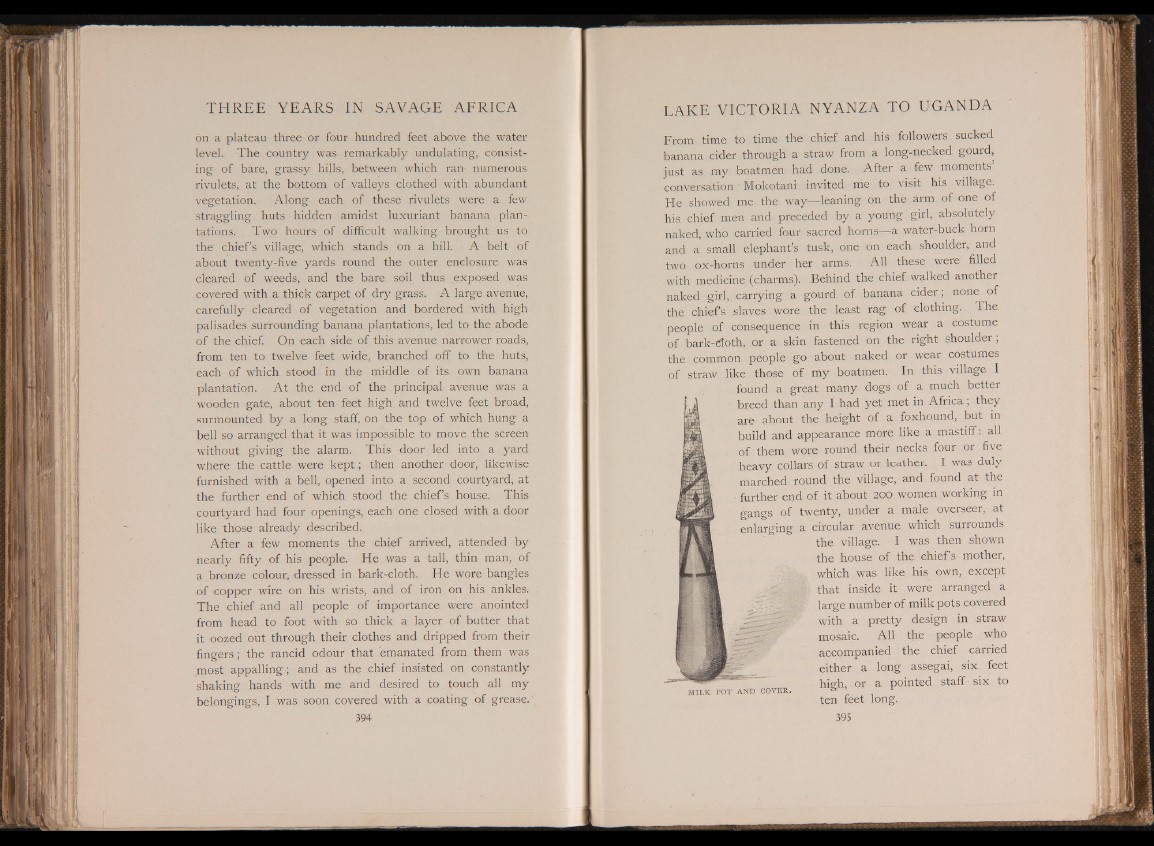
on a plateau three or four hundred feet above the water
level. The country was remarkably undulating, consisting
of bare, grassy hills, between which ran numerous
rivulets, at the bottom of valleys clothed with abundant
vegetation. Along each of these rivulets were a few
straggling huts hidden amidst luxuriant banana plantations.
Two hours of difficult walking brought us to
the chief’s village, which stands on a hill. A belt of
about twenty-five yards round the outer enclosure was
cleared of weeds, and the bare soil thus exposed was
covered with a thick carpet of dry grass. A large avenue,
carefully cleared of vegetation and bordered with high
palisades surrounding banana plantations, led to the abode
of the chief. On each side of this avenue narrower roads,
from ten to twelve feet wide, branched off to the huts,
each of which stood in the middle of its own banana
plantation. At the end of the principal avenue was a
wooden gate, about ten feet high and twelve feet broad,
surmounted by a long staff, on the top of which hung a
bell so arranged that it was impossible to move the screen
without giving the alarm. This door led into a yard
where the cattle were kept; then another door, likewise
furnished with a bell, opened into a second courtyard, at
the further end of which stood the chiefs house. This
courtyard had four openings, each one closed with a door
like those already described.
After a few moments the chief arrived, attended by
nearly fifty of his people. He was a tall, thin man, of
a bronze colour, dressed in bark-cloth. He wore bangles
of copper wire on his wrists, and of iron on his ankles.
The chief and all people of importance were anointed
from head to foot with so thick a layer of butter that
it oozed out through their clothes and dripped from their
fingers; the rancid odour that emanated from them was
most appalling; and as the chief insisted on constantly
shaking hands with me and desired to touch all my
belongings, I was soon covered with a coating of grease.
394
From time to time the chief and his followers sucked
banana cider through a straw from a long-necked gourd,
just as my boatmen had done. After a few moments
conversation Mokotani invited me to visit his village.
He showed me the way—leaning on the arm of one of
his chief men and preceded by a young girl, absolutely
naked, who carried four sacred horns—a water-buck horn
and a small elephant’s tusk, one on each shoulder, and
two ox-horns under her arms. All these were filled
with medicine (charms). Behind the chief walked another
naked girl, carrying a gourd of banana cider; none of
the chief’s slaves wore, the least rag of clothing. The
people of consequence in this region wear a costume
of bark-iioth, or a skin fastened on the right shoulder,
the common people go about naked or wear costumes
of straw like those of my boatmen. In this village I
found a great many dogs of a much better
breed than any I had yet met in Africa; they
are about the height of a foxhound, but in
build and appearance more like a mastiff: all
of them wore round their necks four or five
heavy collars of straw or leather. I was duly
marched round the village, and found at the
■ further end of it about 200 women working in
gangs of twenty, under a male overseer, at
enlarging a circular avenue which surrounds
the village. I was then shown
the house of the chiefs mother,
which was like his own, except
that inside it were arranged a
large number of milk pots covered
with a pretty design in straw
mosaic. All the people who
accompanied the chief carried
either a long assegai, six feet
high, or a pointed staff six to
ten feet long. . M ILK TOT AND COVER.